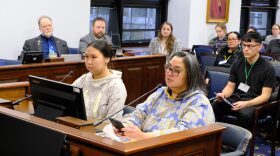-
A delegation of lawmakers made an impromptu visit to the school on Feb. 6, calling the conditions and deteriorating facilities "deplorable."
-
Federal fisheries regulators said a cap would balance protections for Western Alaska salmon with the health of pollock fisheries.
-
Subsistence communities in Western Alaska ask for strict limits on the Bering Sea trawl fishery.
-
On Feb. 9, the Alaska Senate voted 19-0 to extend a state of disaster until early March, retroactively extending a disaster declaration that expired Feb. 6.
-
Bethel Democratic Sen. Lyman Hoffman recently visited his hometown, where he says he plans to spend some quality time after doing what he can to help fund the state's ailing budget in his final legislative session.
-
The council that manages Alaska’s federal fisheries may be just days away from a decision that could limit how much chum salmon the Bering Sea trawl fleet can scoop up as bycatch.
-
Secretary of Defense Pete Hegseth announced the review in January, calling the business development program "the oldest DEI program in the federal government."
-
As directed by a court ruling, the U.S. Army Corps of Engineers is starting to craft a supplemental environmental impact statement for the Donlin Gold mine.
-
Roughly half of Alaska’s school districts qualified for the five-year grant program, which is managed by the state’s education department.
-
The Alaska Federation of Natives has launched an aggressive campaign to fight the Safari Club International's effort to weaken the influence of the federal government on subsistence management in Alaska and restore state authority over its regulation.
-
Nonpartisan analysts say Mary Peltola has a fighting chance, but that Republican Sen. Dan Sullivan has the edge in a state President Trump won handily.
-
Alaska's congressional delegation introduced legislation on Wednesday, Jan. 14 that aims to reduce bycatch in parts of southwest Alaska using better marine data, technology, and gear.
















